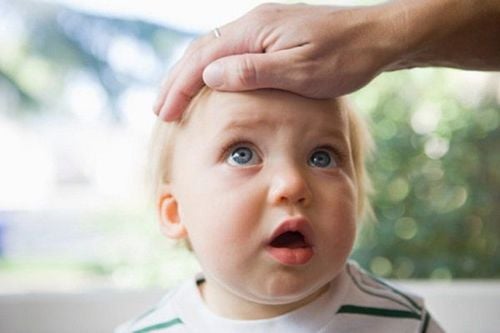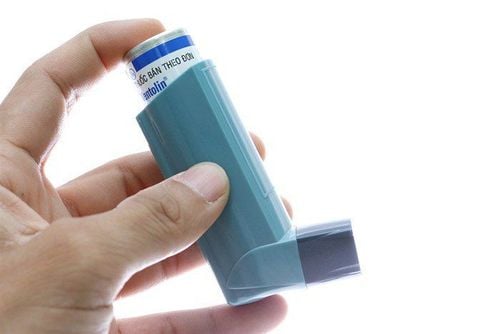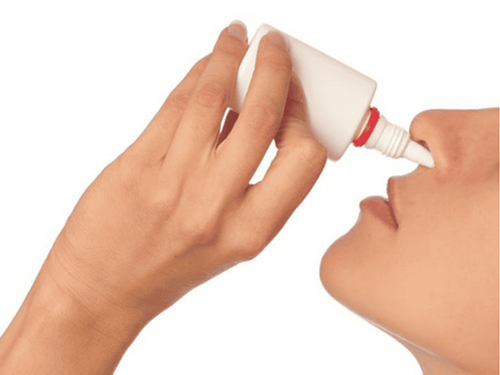This is an automatically translated article.
The article is professionally consulted by Master, Resident Doctor Dang Thi Ngoan - Department of Pediatrics - Neonatology, Vinmec Ha Long International General Hospital.Bronchitis in infants is a common illness, usually lasting 2-3 weeks. Although not a serious disease, if the disease is not detected and treated promptly, it can leave extremely dangerous complications.
1. What is bronchitis in babies?
Bronchitis in infants occurs in the lower respiratory tract, also known as bronchiolitis. However, bronchitis has not yet reached the lungs, just acute inflammation in the lining of the bronchi. When you have bronchitis, your child will cough a lot, along with a sore throat or runny nose. Bronchitis in infants is common in newborns, babies born prematurely, rickets, or malnourished or children who are sick with flu, measles, whooping cough,...2. Causes of bronchitis in babies
Bacterial infections are the leading cause of bronchitis in infants. Common bacteria are pneumococci, staph, or streptococcus,... These bacteria are always present in the nasal cavity - throat but do not affect the child because the immune system is not active. works well. Furthermore, during the first 6 months of life, breastfed infants should inherit antibodies from their mothers that can effectively block the bacteria that cause bronchitis in babies. However, when the body is tired and the child's resistance is lower, bacteria will increase the toxicity and cause the child to get sick. Air pollution is also a major cause of illness, including bronchitis in babies. When children live in a polluted environment, they often breathe in harmful substances such as dust, polluted air, or cigarette smoke, or the smell of chemicals such as the smell of wall paint, the smell of table paint. chairs, a lot of dust in the house, ... are also no small factors that cause bronchitis in children. The weather changes suddenly, from hot to cold, the newborn's body can't adapt in time, which will also make the newborn susceptible to bronchitis. Premature babies and those with certain illnesses such as measles, whooping cough, tonsillitis, or asthma are also at increased risk.3. Signs of bronchitis in babies
The obvious signs are a cold, cough, or rhinitis or sinusitis. If not treated in time, the disease will spread to the two bronchi. The bacteria will make the trachea swollen, red, and mucus will accumulate in the lungs, causing the child to have a fever.Accompanying the signs of a child having a fever is that the child will cough more, leading to a sore throat and the appearance of thick green, yellow or gray sputum. Your child will feel tired, have chest pain, and a low-grade fever.
4. How to handle when babies have bronchitis
To prevent and treat bronchitis in babies, mothers need to pay attention to the following issues:
Ensure the living environment for children is always clean. Avoid letting children breathe in toxic chemical odors such as dirt, especially do not let children breathe in toxic cigarette smoke. Limit foods that stay cool in the refrigerator, such as ice, fruit, milk, or processed foods. Feeding children with adequate nutrients has the ability to strengthen resistance. When putting children in air conditioning, it is necessary to increase and adjust the temperature accordingly, the difference should only be from the outside temperature by 2-3 degrees. Do not let the air conditioner direct to the child's body and also do not let the child lie down for a long time in the air-conditioned room. If the child is lying on a fan, use a light fan, turn on the fan to make the air light. Keep children warm when the weather changes. Do not wear clothes that are too thick and do not absorb sweat, making children more susceptible to colds. When the child is sick, the child should drink more water to moisten the airways and thin the sputum, so that the child can expel the sputum from the respiratory tract faster. For children under 6 months of age, it is recommended to increase breastfeeding or supplement water through formula milk.

Luôn theo dõi nhiệt độ của bé khi bé bị bệnh viêm phế quản.
5. How to prevent bronchitis in babies
Avoid allergens, and at the same time isolate children from smoke and chemical environments. Children should not be too close to dogs and cats. Even many babies with a history of allergies to dog and cat fur are also at risk of developing bronchitis in babies when playing with stuffed animals. Parents should wash their hands thoroughly when holding or feeding a baby. Children's bedrooms need ventilation, fresh air. Carpets should not be placed in the nursery. Regularly wash baby blankets and pillows, then dry in the sun. Parents should clean the child's body, especially the ear, nose and throat areas for children every day. Bronchitis in infants can cause specific complications such as pneumonia, respiratory failure and chronic disease,... Therefore, parents need to be proactive in disease prevention as well as medical treatment. learn to avoid dangerous progression for children.
Besides, parents also need to supplement their children with essential micro-minerals such as zinc, lysine, chromium, selenium, vitamin B1, ... to fully meet the nutritional needs of children. The addition of these essential vitamins also supports digestion, enhances nutrient absorption, improves anorexia, and helps children eat well. Parents can simultaneously apply dietary supplements and functional foods derived from nature for easy absorption. The most important thing is that improving your baby's symptoms often takes a long time. Combining many types of functional foods at the same time or changing many types in a short time can make the baby's digestive system unable to adapt and completely not good. Therefore, parents must be really patient with their children and regularly visit the website vimec.com to update useful baby care information.














